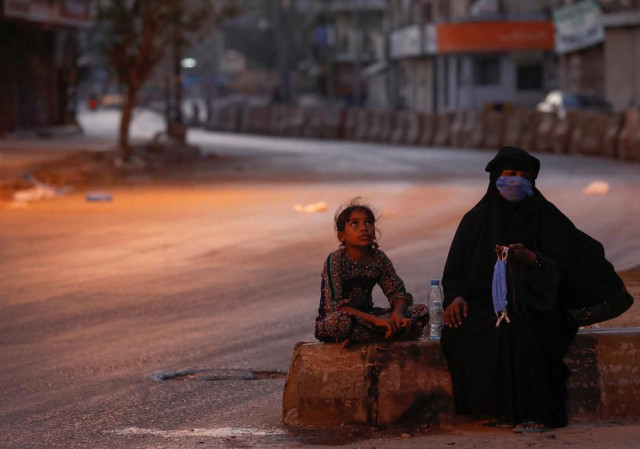Pakistan marks its Covid-19 anniversary
A total of 575,941 cases recorded since the onset of the pandemic

Far from the finish line, Pakistan’s fight against the novel coronavirus began exactly one year ago today. A household name now, the Covid-19 virus was first detected shortly after 22-year-old Yahya Jaffery arrived from Iran.
At the temperature screening gates at Karachi’s international airport, Jaffery was allowed to pass through despite showing early signs of the disease. Little did he know that he would end up being the first carrier of the Covid-19 virus in Pakistan.
Owing to the symptoms, Jaffery got himself tested for coronavirus in the following days. Now healthy, Jaffery describes the mandatory isolation as the most painful moment in his life. “It should be faced with courage," said the survivor.
Looking back at the past 12 months, health experts believe Pakistan did fairly better than other countries in the region. The Covid-19 positivity ratio came back to hovered from 3% to 5%, coming back from a peak of 7% at the beginning of the pandemic.
According to data available on the National Command and Operation Centre's (NCOC) Covid-19 dashboard, the country recorded a total of 575,941 cases and 12,772 deaths since the onset of the pandemic.
Sindh topped the chart with the highest number of positive cases. A total of 257,089 people tested positive in the province, followed by Punjab with 169,474, Khyber-Pakhtunkhwa (K-P) with 71,490, and Balochistan with 19,010 cases. As the cases increased, the government imposed lockdowns and then successfully experimented with smarter restrictions in hotspot areas.
Experts believe that helped in reducing the impact of the virus which has claimed more than 2,500,000 lives globally.
Sindh’s struggle
With more than 257,000 positive cases, Sindh remained the Covid-19 epicenter in Pakistan. The province recorded a total of 4,315 deaths. Health workers in the provincial capital and Pakistan’s business hub, Karachi, said most hospitals were inundated with patients. “The already weak healthcare system collapsed during the peak of the pandemic,” one health expert said.
“Lockdowns and then smart lockdowns helped. The pandemic was a real reality check for the health authorities in Sindh,” a medical practitioner, who spoke on condition of anonymity, said.
Punjab’s battle
Covid-19 cases surfaced in Pakistan’s most populous province on April 16, 2020. Shortly after the first case was reported, the government issued alerts for all hospitals and established dedicated wards. In addition, indiscriminate lockdowns were imposed in all districts of Punjab due to which all businesses and public and private offices were closed.
With 169,474 cases and over 5,300 deaths, Covid-19 remained a nightmare for the province for much of the past 12 months. Hospitals across Punjab struggled with an increase in the number of patients during the pandemic.
The arrival of the vaccine, one health care worker said, raises hope. “Punjab’s frontline workers should receive the shots. They’ve been fighting on the actual frontline,” Dr Javed Ahmed, a physician who has served inside a dedicated Covid-19 ward at a hospital in Lahore, said.
So far, Punjab has received 70,000 vaccines from the centre. In the second phase, it is expected to receive 1.5 million vaccines.
Bad news from K-P
While the first two cases were reported in Sindh and Punjab, Pakistan’s first Covid-19 casualty was recorded in K-P. Saadat Khan, a resident of Union Council Manga in Mardan, became the first victim of the deadly respiratory disease.
Khan died a few days after returning from Saudi Arabia. His death from the novel coronavirus sent shockwaves across the province. Statistics gathered by the provincial government show 2,058 patients have died due to the respiratory disease since March 16 when the first case surfaced.
Dr Iftiklharuddin, an expert in infectious diseases, defines the initial days of K-P’s battle against Covid-19 as “surreal”.
“It engulfed the entire globe, and nobody knew the risk factors. It was not reaction but over-reaction that helped. It was a tough, prompt, over-reaction to the outbreak that helped us stem the spread as compared to other countries.”
Balochistan fights on
With 19,010 cases, Balochistan had its own set of challenges. The virus claimed 199 lives over the past 12 months. “With a better strategy during the global pandemic, the death toll in Pakistan and Balochistan was much lower than in other provinces,” Parliamentary Secretary on Health Dr Rubaba Buledi claimed.
While authorities in the province are optimistic about defeating the coronavirus, they face the mammoth challenge of convincing people about the vaccine’s efficacy.
“In the vaccination drive, the majority refusals are from Baloch and Pashtoon community members, but we are trying to convince them,” Dr Ishaq Panezai, who serves as coordinator Expanded Programme on Immunisation (EPI), said.
So far, the province has vaccinated 2,000 of its 22,000 health workers.
Vaccine
After a yearlong struggle against the coronavirus, Pakistan received its first shot of good news on February 1, 2021. Half a million doses of the Sinopharm vaccine arrived from China. With the steady arrival of vaccines, federal health authorities hope to control the spread of the Covid-19 virus.
Private import of vaccines remains a concern for health authorities in the country. Health experts have expressed serious concerns over the country’s decision to allow private import of the coronavirus vaccines.



















COMMENTS
Comments are moderated and generally will be posted if they are on-topic and not abusive.
For more information, please see our Comments FAQ